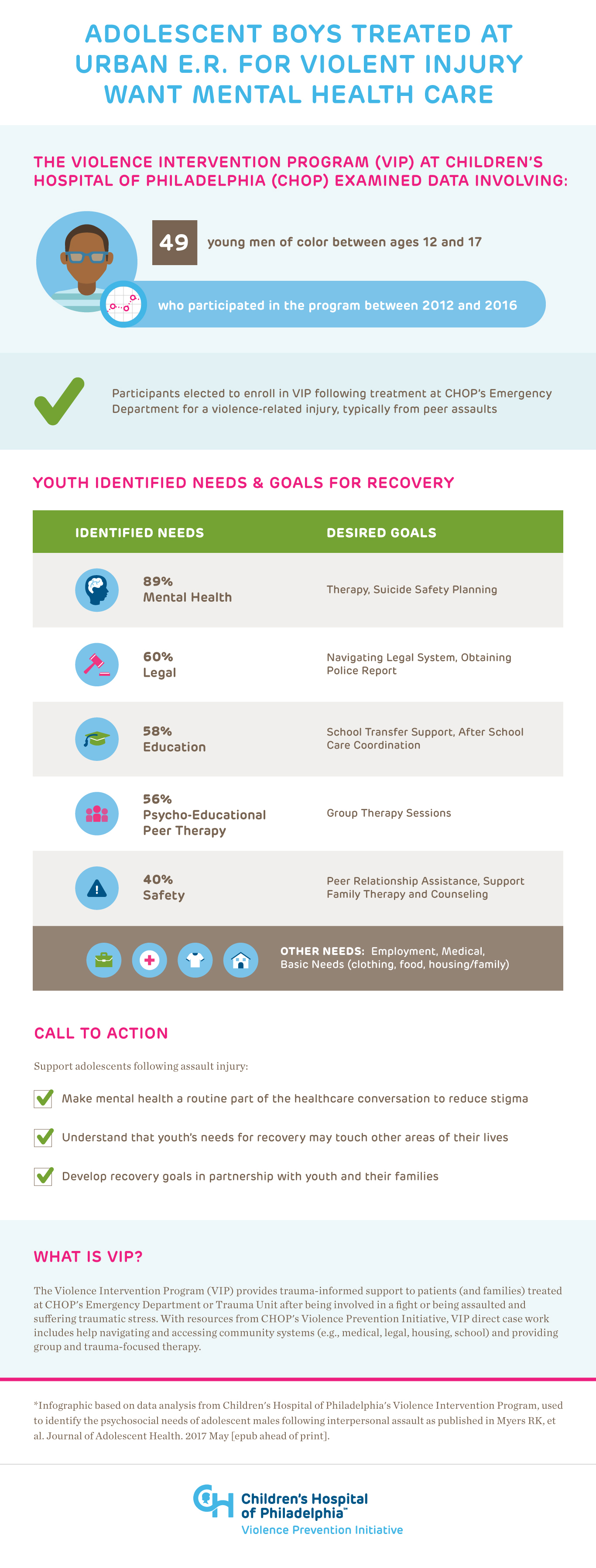HOW CAN WE HELP YOU? Call 1-800-TRY-CHOP
In This Section
Do Assault-injured Youth Want Mental Health Care?

The findings:
The majority of adolescent males receiving care in the pediatric emergency department after experiencing a violence-related injury — typically from peer assaults — felt they needed mental health services, according to a study by researchers from the Violence Intervention Program (VIP) at Children’s Hospital of Philadelphia. Eighty-nine percent of the study participants, who voluntarily enrolled in VIP following treatment in CHOP’s Emergency Department, said they wanted mental health therapy or suicide counseling. Fifty-six percent also identified the need for psychosocial support such as peer group sessions with other injured youth. These results suggest that clinical staff treating assault-injured youth should routinely inquire about mental health during healthcare conversations.
Why it matters:
Each year, CHOP’s Emergency Department clinicians see more youth who have been violently injured. This study demonstrates that attending to their external wounds is not enough. Young men who were treated for violent injury and discharged may be suffering significant traumatic stress symptoms, such as feeling constantly tense, having nightmares or flashbacks of the assault, and avoiding the places or school friends who remind them of the assault.
Who conducted the study:
VIP researchers, including lead author Sage R. Myers, MD, MSCE, who is a research scientist with CHOP’s Violence Prevention Initiative; Laura Vega, MSW; Alison Culyba, MD, PhD; and Joel Fein, MD, MPH, worked in partnership with youth and their families.
How they did it:
Forty-nine adolescent males, ages 12 to 17 were treated at CHOP’s Emergency Department between 2012 and 2016 after suffering a violence-related injury and voluntarily enrolled in VIP. Researchers examined the needs and goals for recovery that young men described at intake and during the course of their participation in intensive case management.
Quick thoughts:
“This work highlights how adolescent males who receive care in the ED with what may be physically minor injuries are, in fact, suffering significant trauma,” Dr. Myers said. “Young men not only need, but want help to cope with the fears and difficult emotions experienced in the aftermath of injury.”
What’s next:
Evidence-based approaches to trauma-informed mental health therapy for assault-injured youth can help enhance their resiliency and return to normal adolescent activities. Individuals who treat adolescents at CHOP’s Emergency Department or Trauma Unit can refer patients to the multidisciplinary VIP team, which provides young people with support in the aftermath of an injury, such as helping them to navigate medical and legal services, and to access mental health services.
“The results of this research strongly indicate that when asked, violently injured young men will be open about their recovery needs,” Dr. Myers stated in a blog post about the study. “We just need to be able to ask and listen to them.”
Where to learn more:
Read the Research in Action blog post by Dr. Myers. See a press release about the study. Get more information about VIP and resources provided by CHOP’s Violence Prevention Initiative. View an infographic.

Provided by the Violence Prevention Initiative, courtesy of MoreVisibility


